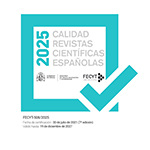Women artists as an emotional community: gender and emotions in the diaries of Delhy Tejero and Manuela Ballester
Abstract
This article analyzes the diaries of Delhy Tejero and Manuela Ballester, two women artists born in the first decade of the 20th century in the Spanish context, from a perspective that intertwines the history of emotions with the history of gender. The starting point is Barbara Rosenwein's concept of "emotional community", understood as a group of individuals linked by a "system of feelings" through which they define their own and others' emotions, the affective bonds between people and the modes of emotional expression they expect, encourage, tolerate or deplore. We have understood gender here as a configurator of emotional communities, since we assume that the ways of feeling and experiencing the world are genderized and shared by subjects according to their gender identity. The research, in short, takes as its main source the intimate diaries, unpacks their content and understands Spanish women artists of the 20th century as an emotional network that shares a perception of the world, their position in it and a similar way of being affected by it.
Downloads
Article download
License
In order to support the global exchange of knowledge, the journal Arte, Individuo y Sociedad is allowing unrestricted access to its content as from its publication in this electronic edition, and as such it is an open-access journal. The originals published in this journal are the property of the Complutense University of Madrid and any reproduction thereof in full or in part must cite the source. All content is distributed under a Creative Commons Attribution 4.0 use and distribution licence (CC BY 4.0). This circumstance must be expressly stated in these terms where necessary. You can view the summary and the complete legal text of the licence.










